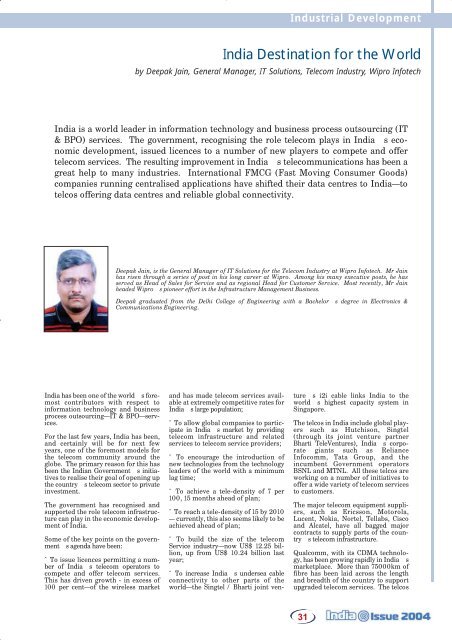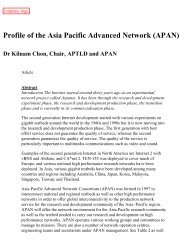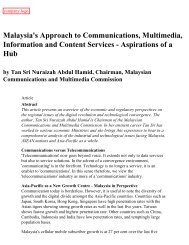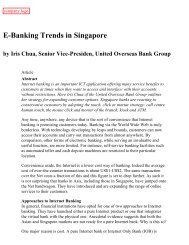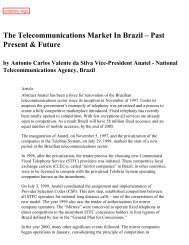Contents - Connect-World
Contents - Connect-World
Contents - Connect-World
You also want an ePaper? Increase the reach of your titles
YUMPU automatically turns print PDFs into web optimized ePapers that Google loves.
Industrial Development<br />
India Destination for the <strong>World</strong><br />
by Deepak Jain, General Manager, IT Solutions, Telecom Industry, Wipro Infotech<br />
India is a world leader in information technology and business process outsourcing (IT<br />
& BPO) services. The government, recognising the role telecom plays in Indias economic<br />
development, issued licences to a number of new players to compete and offer<br />
telecom services. The resulting improvement in Indias telecommunications has been a<br />
great help to many industries. International FMCG (Fast Moving Consumer Goods)<br />
companies running centralised applications have shifted their data centres to India—to<br />
telcos offering data centres and reliable global connectivity.<br />
Deepak Jain, is the General Manager of IT Solutions for the Telecom Industry at Wipro Infotech. Mr Jain<br />
has risen through a series of post in his long career at Wipro. Among his many executive posts, he has<br />
served as Head of Sales for Service and as regional Head for Customer Service. Most recently, Mr Jain<br />
headed Wipros pioneer effort in the Infrastructure Management Business.<br />
Deepak graduated from the Delhi College of Engineering with a Bachelors degree in Electronics &<br />
Communications Engineering.<br />
India has been one of the worlds foremost<br />
contributors with respect to<br />
information technology and business<br />
process outsourcing—IT & BPO—services.<br />
For the last few years, India has been,<br />
and certainly will be for next few<br />
years, one of the foremost models for<br />
the telecom community around the<br />
globe. The primary reason for this has<br />
been the Indian Governments initiatives<br />
to realise their goal of opening up<br />
the countrys telecom sector to private<br />
investment.<br />
The government has recognised and<br />
supported the role telecom infrastructure<br />
can play in the economic development<br />
of India.<br />
Some of the key points on the governments<br />
agenda have been:<br />
ˆ To issue licences permitting a number<br />
of Indias telecom operators to<br />
compete and offer telecom services.<br />
This has driven growth - in excess of<br />
100 per cent—of the wireless market<br />
and has made telecom services available<br />
at extremely competitive rates for<br />
Indias large population;<br />
ˆ To allow global companies to participate<br />
in Indias market by providing<br />
telecom infrastructure and related<br />
services to telecom service providers;<br />
ˆ To encourage the introduction of<br />
new technologies from the technology<br />
leaders of the world with a minimum<br />
lag time;<br />
ˆ To achieve a tele-density of 7 per<br />
100, 15 months ahead of plan;<br />
ˆ To reach a tele-density of 15 by 2010<br />
— currently, this also seems likely to be<br />
achieved ahead of plan;<br />
ˆ To build the size of the telecom<br />
Service industry—now US$ 12.25 billion,<br />
up from US$ 10.24 billion last<br />
year;<br />
ˆ To increase Indias undersea cable<br />
connectivity to other parts of the<br />
world—the Singtel / Bharti joint ventures<br />
i2i cable links India to the<br />
worlds highest capacity system in<br />
Singapore.<br />
The telcos in India include global players<br />
such as Hutchison, Singtel<br />
(through its joint venture partner<br />
Bharti TeleVentures), Indias corporate<br />
giants such as Reliance<br />
Infocomm, Tata Group, and the<br />
incumbent Government operators<br />
BSNL and MTNL. All these telcos are<br />
working on a number of initiatives to<br />
offer a wide variety of telecom services<br />
to customers.<br />
The major telecom equipment suppliers,<br />
such as Ericsson, Motorola,<br />
Lucent, Nokia, Nortel, Tellabs, Cisco<br />
and Alcatel, have all bagged major<br />
contracts to supply parts of the countrys<br />
telecom infrastructure.<br />
Qualcomm, with its CDMA technology,<br />
has been growing rapidly in Indias<br />
marketplace. More than 75000km of<br />
fibre has been laid across the length<br />
and breadth of the country to support<br />
upgraded telecom services. The telcos<br />
31


